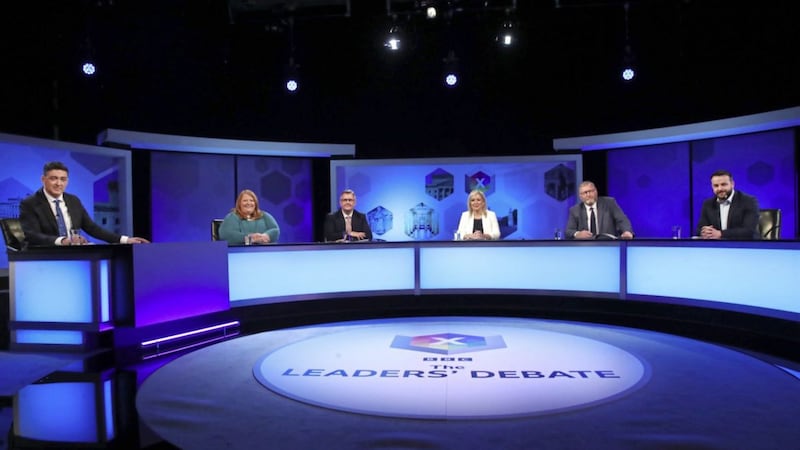I’m not sure if leaders’ debates actually make much of a difference to voting intentions.
They tend to be screened a few days before the election and by that stage I’m quite sure the vast majority of those planning to vote have made up their minds.
A snap opinion poll, conducted the minute the BBC debate ended on Tuesday evening, found that just 11 per cent were now ‘seriously considering’ changing their first preference vote, or finally deciding where their first preference would go. Another 13 per cent said they ‘may’ consider changing their first preference vote. And the remaining 76 per cent said the debate had either made no difference to their voting intention or left them just as undecided at the end as they were at the beginning.
I think most of us watch them as spectator sport rather than for any insight or guidance they may offer. All five leaders repeated some of the same lines they had used during Sunday’s debate on UTV: and even a couple of the supposed ad libs sounded rehearsed. Indeed, most of the contributions sounded scripted and over-heated, like they were the result of practice with the backroom team. Which they probably were.
Every possible question will have been road-tested in the run-up to the debates and every possible answer (and follow-up question) will have been ground through the mill. Body language will have been discussed. As will tone of voice and how and when to look meaningfully into the camera. One-liners will have been prepared for use (with recommendations when to use them) and everyone will have been prepped on possible ‘killer blows’ to floor their main rivals.
In essence, it’s a political debate by numbers: more petulance than passion, with no one wanting to make the mistake that could wreck their electoral chances. Soundbites, cliché, constant repetition, mantras and assorted pledges take the place of argument, counterargument, construction and deconstruction. And if I had taken a shot of alcohol every time I heard the line, “what people are telling me on the doorstep,” I’d still be too drunk to do commentary, let alone navigate a keyboard and write a column. (Don’t think I can’t hear those of you saying, “when has that ever stopped him before”!)
The question that kept running around my head during debates was this: what are the chances of these leaders, irrespective of the outcome of yesterday’s election, reaching an agreement and kickstarting an executive anytime soon? At some points during both debates you could have been forgiven for assuming that the DUP had been the sole party of government during the last mandate. The other four leaders were using Jeffrey Donaldson as a punchbag, accusing him of one fault after another and seeming to forget that all five parties had been in the last executive (and in others before it).
You could also have been forgiven for imagining that the relationship between the UUP, SDLP, Alliance and SF had been one of harmony and cooperation in the past. Had we—had they—forgotten the ten bells they used to knock out of each other on a regular basis? The executive was just as dysfunctional before the DUP and SF cut their own bespoke deal in May 2007. The pile of problems between 1998 and 2007 was just as capable of producing showdowns and stalemates as the problems confronting the executives between 2007 and 2017.
Not once did the parties sign up to a programme for government for which they took collective responsibility and delivered together. Both debates had lengthy sections on health, with all five leaders setting out suggestions and promising to take the ‘tough decisions needed to make it better.’ It’s the same thing their predecessors were saying in 1998. Pick almost any issue you can think of, and you’ll discover how much remains to be done since the first assembly was elected in June 1998. And for so long as we have a mandatory coalition (where even the smaller party ministers tend to prefer the silo approach to decision making) then for so long will things remain the same.
I’m not even sure a voluntary option would change things all that much. A ‘coalition of the willing’ (although I suspect it would morph into a coalition of the shrilling) would still have to be counterbalanced with a fully functioning opposition and ‘weighted majority’ protections: and that, I’m fairly sure, would also lead to regular veto just for the sake of it. And that’s because it’s not just the structures that result in bad, tetchy, non-cooperative government. It’s also the fact—denied by everyone of course—that most of the parties still don’t trust each other enough to take the risks necessary work honestly together.
They all talked the talk on Sunday and Tuesday. But there was scant evidence of a willingness to walk the walk—honestly and hand-in-hand—to genuine cooperation.








